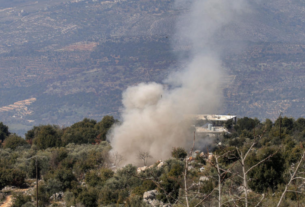The United States has escalated its military campaign against Yemen’s Houthi rebels in response to continued attacks on Red Sea shipping. U.S. forces have carried out multiple airstrikes targeting Houthi missile sites, drone launchers, and command centers. Officials emphasize that these operations are necessary to protect global trade and ensure the security of commercial vessels.
The Trump administration considers the Houthis a major threat to international shipping. The rebel group has launched more than 80 attacks on merchant vessels since October 2024, claiming they are linked to Israel.
American warships have intercepted missiles and drones, but defense officials argue that passive measures alone are insufficient to stop future strikes. The military campaign aims to dismantle the Houthis’ offensive capabilities and prevent further disruption to trade routes.
The ongoing attacks have forced major shipping companies to reroute their vessels, increasing transportation costs and delaying essential goods. Businesses that rely on Red Sea shipping have reported higher expenses due to longer travel routes around Africa.
These disruptions have impacted global supply chains, affecting the delivery of energy resources, food supplies, and manufactured products. To address the crisis, the U.S., along with the United Kingdom and other allies, has launched a coordinated military response to weaken the Houthis’ operational strength.
Despite the airstrikes, Houthi leaders remain defiant. They claim their attacks are in support of Palestinians in Gaza and insist that foreign military action will not force them to back down. The group has vowed to continue its operations against vessels they believe are linked to Israel or Western interests.
Diplomatic efforts to de-escalate tensions have made little progress, as the Houthis refuse to negotiate while foreign airstrikes continue. The situation has further complicated peace talks in Yemen, where the rebels have been engaged in a long-running conflict against the Saudi-backed government.
The conflict has also raised concerns over Iran’s involvement. U.S. intelligence has reported evidence of Iranian support for the Houthis, including shipments of missiles and drones. This has fueled accusations that Tehran is directly aiding the rebel group to expand its influence in the region.
Iranian officials deny playing an active role in the attacks, stating they do not control the Houthis’ military decisions. Washington has urged Iran to stop supplying weapons and rein in its allies to prevent further escalation.
The Red Sea is a critical global trade route, carrying billions of dollars in goods every year. The U.S. has increased its naval presence in the region, deploying additional warships to patrol the waters and intercept potential threats. Military officials have stated that operations will continue as long as necessary to halt Houthi attacks and restore stability to the region.
While airstrikes may temporarily weaken Houthi forces, eliminating the threat entirely remains a challenge. The group has shown resilience in past conflicts and has expanded its attack range, with missiles and drones now reaching farther into the Arabian Sea. Experts warn that the situation could escalate further, with no immediate resolution in sight.
The U.S. and its allies are expected to maintain their military operations in the coming weeks. As both sides refuse to back down, tensions in the region remain high, with the potential for further conflict and economic consequences.




